A continuously increasing number of Indonesian Muslims performing umrah (minor haj) to the Islamic holy land of Mecca, Saudi Arabia, has led to an increase in travel agencies offering trip packages throughout predominantly Muslim Indonesia. There are over 800 agencies catering to the lucrative business. Their sheer number, fierce competition and poor state oversight have led to widespread fraudulence committed by rogue traders exploiting people’s ignorance and limited knowledge.
Fifty-year-old Rita Mala Rachmad never thought that her umrah trip in March this year would turn into a nightmare for her three in-laws, who became victims of a fraudulent travel agency that she recommended. Rita performed umrah in March using a service provided by Bogor-based Amani Madinah Tour and Travel agency. Satisfied with the service, the Lampung resident then recommended the travel company to her relatives.
However, since transferring Rp 66 million (US$4,966.5) to the travel company’s director for her in-laws’ trip, their flights have been rescheduled thrice with no certainty on departure date as no one was able to contact the director. It was reported that the director had fled, taking the in-laws’ money and that of other potential pilgrims.
Overwhelmed with guilt for potentially having lost the money, Rita has been living in a nightmare, suffering from anxiety, lack of sleep and irregular heartbeats. Her nightmare is but one of countless umrah fraud cases taking a toll on folks like her: tour operators close as soon as they rake in billions of rupiah from unsuspecting pilgrim hopefuls who have no way of getting their money back.
Amani Madinah has been in the media spotlight for allegedly deserting hundreds of clients in May. The company left 50 umrah pilgrims stranded at the Kuala Lumpur International Airport in Malaysia as it only provided the pilgrims with flight tickets from Jakarta to Kuala Lumpur—not to Mecca. Amani Madinah is the latest example of the many deceitful travel agencies exploiting less informed pilgrims.
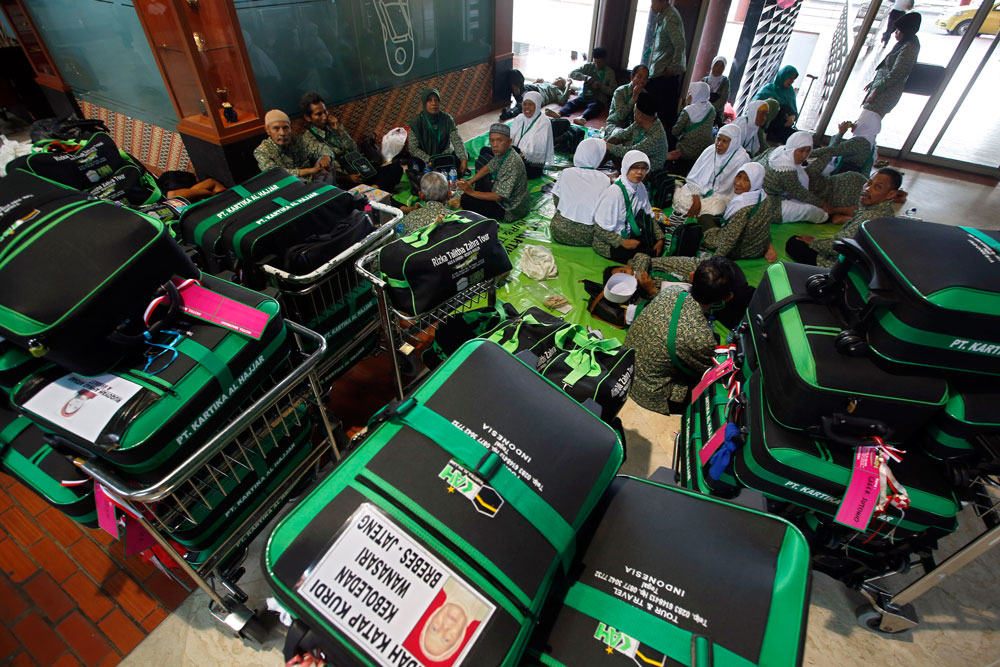 The waiting game: People from Central Java wait for their departures for umrah (minor haj) trips in Soekarno-Hatta International Airport in Tangerang, Banten. (JP/Jerry Adiguna)
The waiting game: People from Central Java wait for their departures for umrah (minor haj) trips in Soekarno-Hatta International Airport in Tangerang, Banten. (JP/Jerry Adiguna)
Umrah is a non-mandatory Muslim pilgrimage often as part of the haj. However, in contrast to the haj, umrah can be undertaken at any time of the year.
Umrah has been popular as the journey allows Indonesian Muslims to have spiritual experiences in the city, where Islamic teachings were first revealed to Prophet Muhammad, without having to wait for years as what happens when applying for the compulsory haj. With the latest annual haj quota set by the Saudi government at only 231,000, a Muslim who wants to perform haj must wait for a decade or more before going.
Data from the Religious Affairs Ministry shows a 63.6 percent jump in the number of umrah pilgrims to 818,000 in 2016, from only 500,000 in 2012. This year, the Saudi Embassy in Jakarta has predicted that the number of umrah pilgrims will reach up to 1 million people.
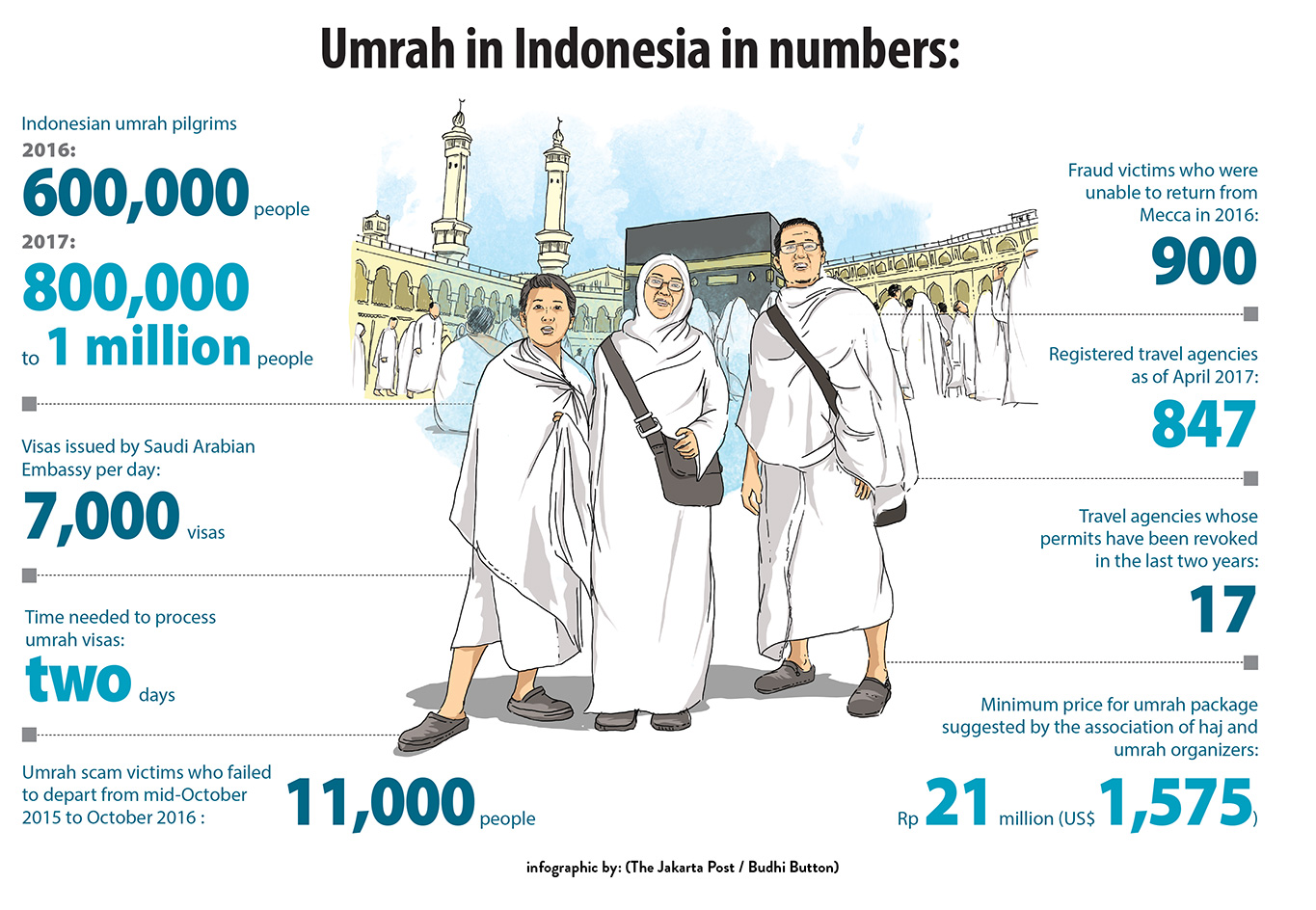
This year, the Saudi Embassy in Jakarta
has predicted that the number of umrah pilgrims
will reach up to 1 million people.
As more and more people are interested in performing umrah, the religious ritual has turned into a lucrative business with many companies offering both premium and economic packages and services. There are 847 registered umrah operators at the ministry with business turnover estimated at around US$1 billion annually, according to the Association of Haj and Umrah Private Operators.
However, lack of monitoring and supervision from the authority has made the business prone to scams. In many cases, potential pilgrims from small cities become an easy target with companies exploiting their lack of information and naivety. Yet, fraudulent practices happen across the board, both on customers paying premium prices and discounted prices.
People have fallen victim to promotional packages offered by travel companies that promise discounted prices. One such case involves PT First Anugerah Karya Wisata (First Travel) that offered a package at Rp 14.3 million or 30 percent less than the suggested price. The low price has lured thousands of people from all corners of the nation to register even though they have to wait one year before traveling.
The problem began in March this year when hundreds of customers started to flock to First Travel’s headquarters on Jl. TB Simatupang in South Jakarta after their trips were delayed several times. No official number on disappointed customers was available, but First Travel was reportedly scheduled to send 70,000 customers on flights to the holy land.
“We, however, are committed to continue sending our customers to perform umrah,” First Travel representative Andika said during a press conference in April.
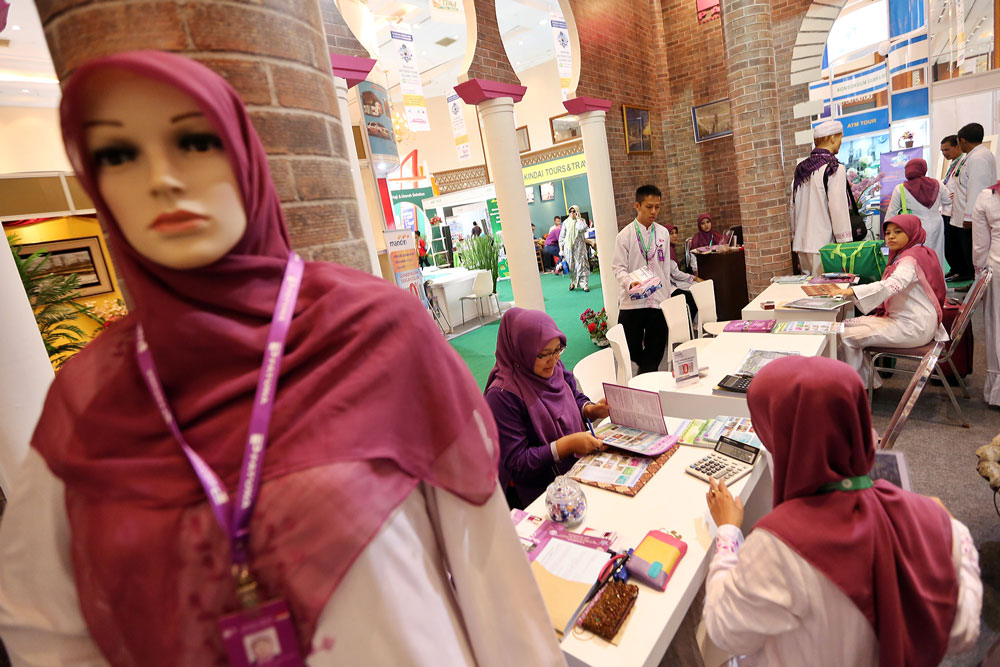 Take care: A visitor looks for information on umrah (minor haj) packages offered by various travel agents during an Islamic expo in Jakarta. Propelled by the rising number of middle-class people, umrah has become a big business in Indonesia. However, some travel agents have taken advantage of their consumers’ religious desire to perform the pilgrimage, embezzling the money and abandoning the potential pilgrims. (JP/Ricky Yudhistira)
Take care: A visitor looks for information on umrah (minor haj) packages offered by various travel agents during an Islamic expo in Jakarta. Propelled by the rising number of middle-class people, umrah has become a big business in Indonesia. However, some travel agents have taken advantage of their consumers’ religious desire to perform the pilgrimage, embezzling the money and abandoning the potential pilgrims. (JP/Ricky Yudhistira)
The Religious Affairs Ministry initiated mediation efforts between its management and the customers. However, the management of First Travel did not show up to three scheduled meetings, while the ministry has not done much to reprimand the company despite a constant flow of complaints against the travel agency. Fearing they will not get their money back, no customers have brought the case to the police.
The umrah director at the ministry’s umrah and special haj directorate general, M. Arfi Hakim, said his team was investigating the case.
“We have to scrutinize the case first before deciding on anything,” he said, adding that penalties against First Travel await in the form of written warnings or permit revocations if the agency is proven to have violated regulations.
Regulations require travel operators offering umrah trips to obtain permits from the ministry and provide trip packages that include transportation, meals, tour guides and accomodation at a 3-star hotel at least.
In the last two years, the ministry has revoked operational permits for 17 travel agencies due to poor services. However, scams and ticket fraud may be the bigger issue.
The association recorded that 11,000 people from October 2015 to October 2016 were unable to partake in planned trips after becoming victims of umrah business scams. Meanwhile, 900 people were unable to return home from Mecca earlier this year after falling to ticket scams.
The ministry’s umrah and special haj director general, Muhajirin, called on potential pilgrims to be cautious of packages offering low prices.
“We need to be careful [...] If the price is too cheap, the facilities too good, it is usually a scam,” he said.
He also found that some travel agencies adopted the Ponzi scheme in their packages, sending a pilgrim, for example, on umrah using money coming from 10 other pilgrims recruited by companies or the Mecca-bound pilgrim. The system tumbles when the companies fail to get new clients. This malpractice is rampant in Makassar, South Sulawesi; Surabaya, East Java; Medan, North Sumatra; and Jakarta.
Yet, despite the widespread malpractice, the ministry still has not made significant moves. It set up a new directorate general for umrah business earlier this year, but it lacks experience and resources to handle all the cases. It hopes the cases will be resolved by the companies themselves.
“We can’t really process the cases when the tour companies have conveyed their good intention to resolve them,” said Muhajirin.
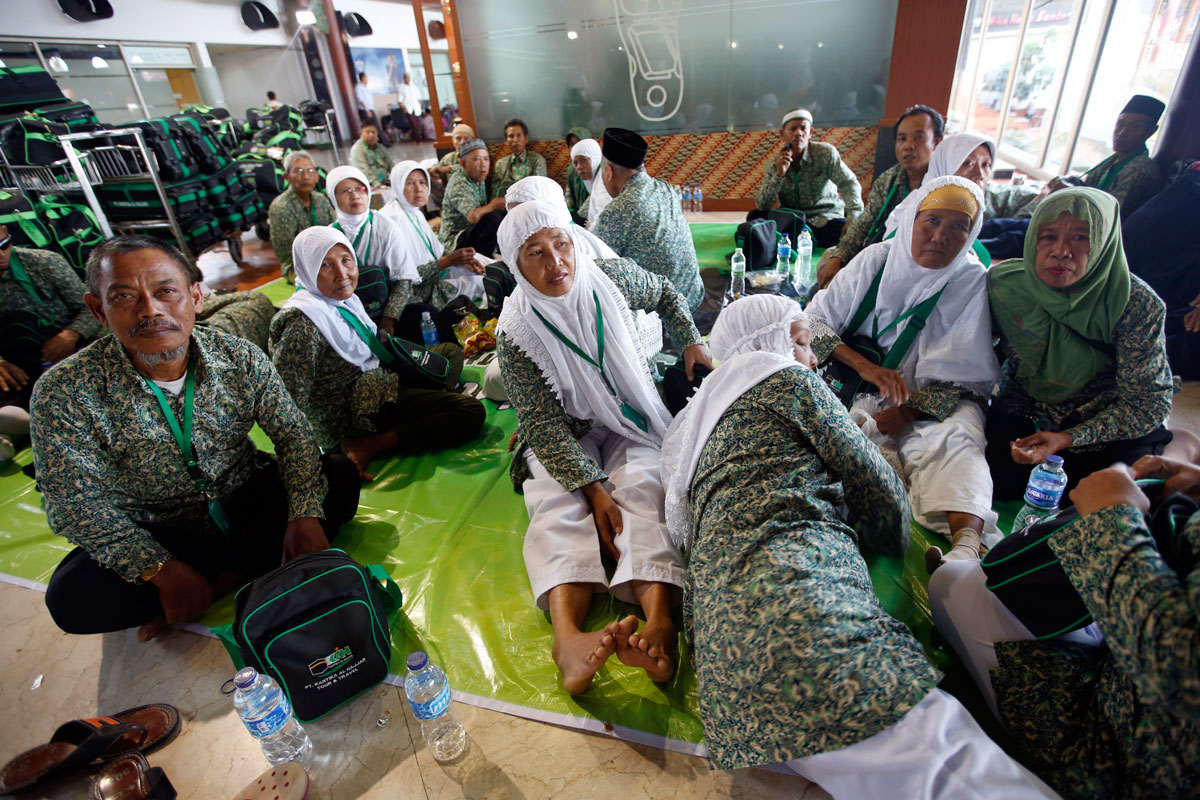 Pilgrims: People await their departures to Saudi Arabia to perform umrah (minor haj). (JP/Jerry Adiguna)
Pilgrims: People await their departures to Saudi Arabia to perform umrah (minor haj). (JP/Jerry Adiguna)
Learning from the First Travel case, relying on good intentions does not solve the problem, which involves not only opportunistic travel operators and innocent customers, but also an ignorant authority.
As for Rita, she has to deal with the consequences of getting scammed. Perhaps she should have sensed something was wrong when the travel company broke its promise to take pilgrims to Turkey for sightseeing en route to Mecca and warned her relatives. She now feels responsible for losing her relatives’ money to an unreliable travel agency.
As of the publication of this article, management from First Travel and Amani Madinah could not be contacted for comments.
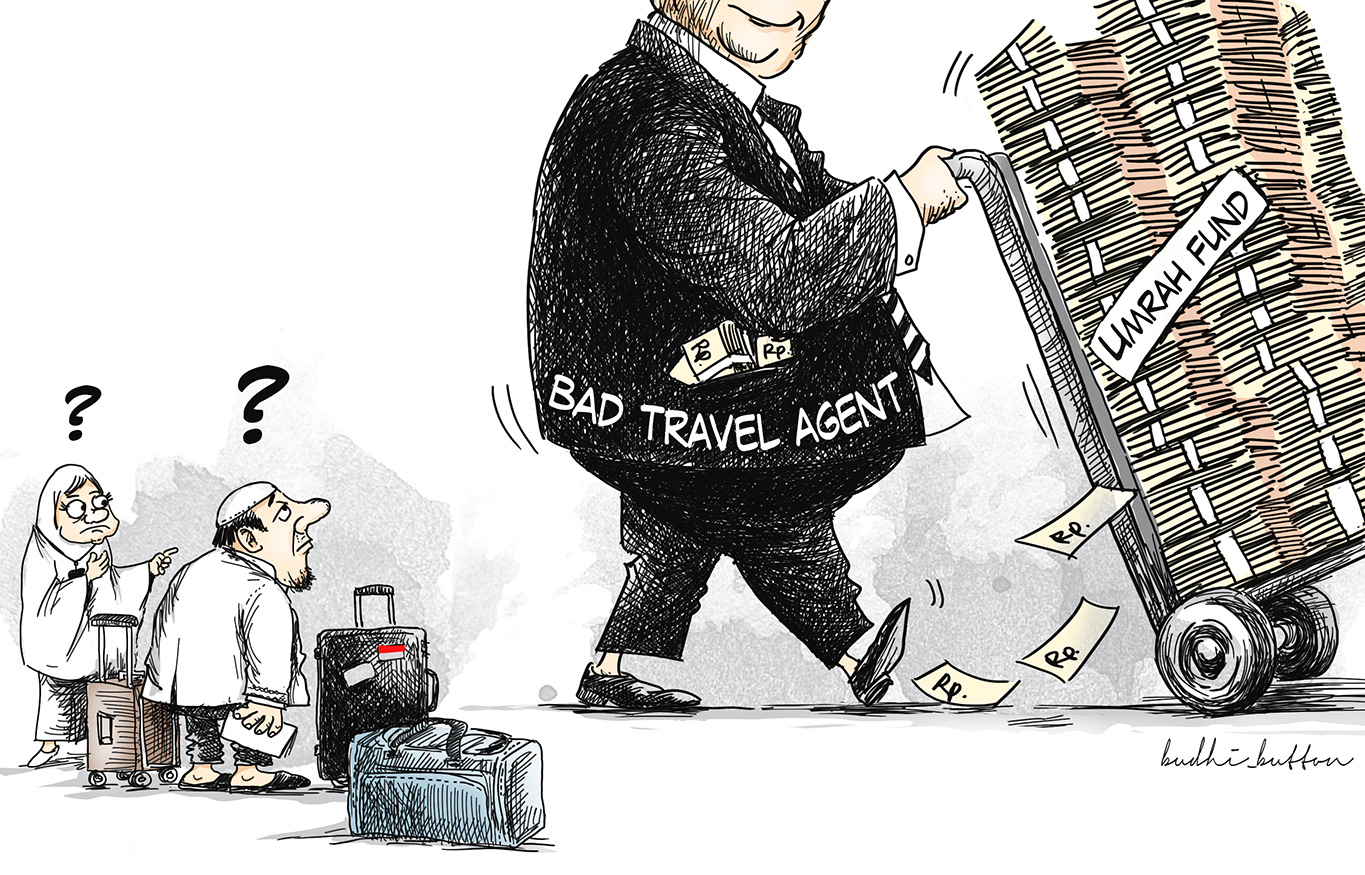
Experiencing ‘umrah’: Between expectations and reality
“Wow. We have just practiced Sa’i,” 34-year-old Eka Murtiani mockingly yelled as she and 47 other pilgrims in her group were told to go back and forth between two different spots to find their bus at the Soekarno Hatta International Airport in Tangerang in one afternoon. She was referring to one ritual of the umrah, where pilgrims go back and forth between the Safa and Marwah hills.
Most of the pilgrims looked hungry. Yet no one complained although they only finally managed to have lunch at 5 pm.
Members of the pilgrim group, mostly from Lampung, were on their umrah, considered the most important Muslim spiritual trip to Mecca after the haj. They had never thought that catching the bus would become the beginning of a series of dramatic occurrences during their trip, managed by Bogor-based travel agency Amani Madinah. Instead of checking in at the airport to fly to Turkey on the evening as scheduled, they were checked in at a budget hotel in Mangga Dua, Central Jakarta, late that afternoon.
“The umrah lounge [at the airport] is limited, while we can use the hotel’s meeting room freely. Also you can have a rest first in the hotel rooms,” said Amani director Silvia Eka Putri, who also joined the umrah trip. Silvia later announced that the group, whose trip had been re-scheduled once, would not take Turkish Airlines as earlier mentioned, but the national flag carrier Garuda Indonesia.
The announcement did not seem to bother the pilgrims, who apart from a few young couples were mostly elderly citizens. “C’mon, c’mon … Let’s have dinner,” said some of the elders, walking away from the meeting room while the young ones were still busy complaining.
It turned out that the ticket and visa provider had just secured the tickets for all the pilgrims a few hours before the flight, while the trip to Istanbul, the main attraction of the umrah package, was already out of the question as the company had no time to apply for Turkish visas. The company, however, promised to give the pilgrims better services in exchange.
Amani Madinah, which does not have an official permit to operate umrah tours, cooperated with the registered PT Anugerah Citra Mulia to provide the visas and tickets. It was found out later, however, that the registered travel agencies are prohibited to cooperate with those without a license to offer umrah services.
In the plane to Jeddah the next day, the drama continued. Pilgrims were forced to change seats after they boarded the Airbus A330. “The front rows need to be empty to balance the plane,” said a flight attendant, explaining the moves to the confused and upset passengers. The flight crew members even forgot to give passengers the obligatory pre-flight safety demonstration, despite the fact that there were no TV monitors in front of the passengers’ seats.
However, the pilgrims were also responsible for more headaches during the flight. During their return flight, for example, the toilet turned into a battlefield for flight attendants as some pilgrims did not flush the toilet. The crew then wrote a notice on a piece of paper to solve the problem. “Press This Button to Flush,” it read in Indonesian. In another instance, a flight attendant yelled at a male passenger as he was peeing without closing the door. Meanwhile, a female pilgrim insisted on sitting next to her husband although her original seat number was different. Another funny sight was a strip of tissue paper tucked above a reading lamp that was on the whole flight.
In response to complaints about the service it provided to the pilgrims, Garuda Indonesia Service Director Nicodemus P. Lampe denied that his company provided a different level of service for those on umrah tours.
“We have the same operational standard,” he said, while insisting that the pre-flight safety demonstration was a must and that the flight attendants were also trained to serve first-time flyers carrying out the umrah.
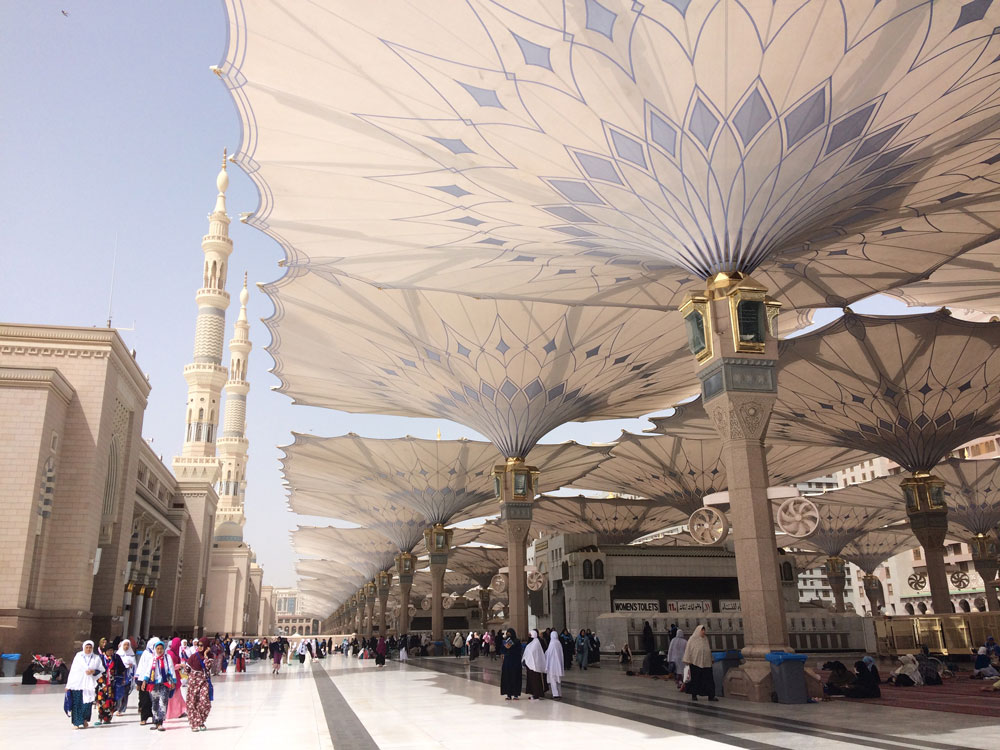 Hide from the sun: Female pilgrims walk under giant umbrellas at the Nabawi Mosque in Madinah. (JP/Corry Elyda)
Hide from the sun: Female pilgrims walk under giant umbrellas at the Nabawi Mosque in Madinah. (JP/Corry Elyda)
The pilgrims eventually arrived at King Abdul Azis International Airport in Jeddah after almost 48 hours of travel, including a nine-hour flight. However, they still needed to go through a slow immigration process before they could catch a bus to Mecca to carry out the umrah. It took almost one hour for a person to get his or her passport stamped although there were only 10 people queuing in each line.
After passing the immigration gate at the airport, pilgrims bathed in a facility with around 10 showers and toilet rooms as they needed to be clean before entering the holy city of Mecca.
The Saudi Arabian Ambassador to Indonesia, Osama bin Mohammed Abdullah Al Shuaibi, said his government was currently developing a new and modern airport in Jeddah.
“Regarding the immigration process, please excuse us as we need to double check so as to ensure the visa is not fake,” he said. Moreover, he added, Saudi Arabia needed to be extra cautious with visitors as they could be members of black-listed organizations like ISIS or illegal immigrants.
During their stay in Saudi Arabia, the promise of better services from the agency were not realized. The visits to a number of historical places only allowed them to get a quick glance. Yet, despite the poor services, most of the pilgrims looked satisfied and happy with their trip. Some passengers, however, managed to get compensation after complaining to the travel company about the unmet promises.
10 Tips for avoiding fraudulent umrah packages
- Check the status of travel agencies, they should be registered on the Religious Affairs Ministry website.
- Read news and reviews of these travel agencies in online forums.
- Be cautious about prices and compare them with others.
- Select your departure dates.
- Ask for issued booking codes or tickets for return flight.
- Avoid flights with many transits.
- Ensure visas are already in hand. Check here.
- Scrutinize the purchasing agreement contract offered by travel agencies to know your rights if their services are not fulfilled.
- Umrah packages should be full service, including transportation, accommodation, meals, baggage handling at the airport, a guide and a stay at a three-star hotel as required by the Religious Affairs Ministry.
- Be cautious with re-scheduled trips.
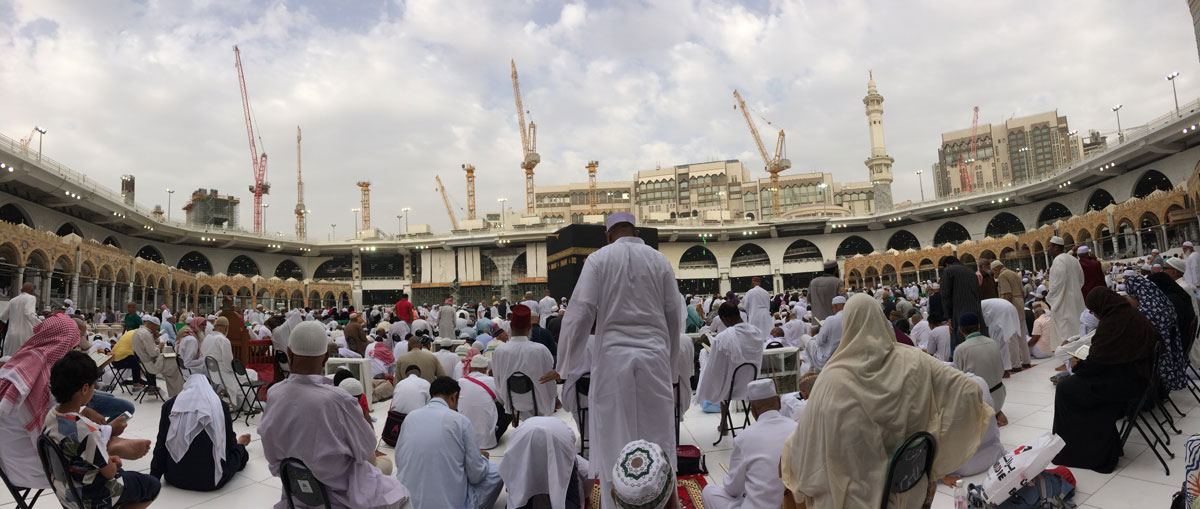 Faith under construction: Pilgrims pray facing the Ka’bah after exercising tawaf, an umrah ritual in which pilgrims circle the Ka’bah seven times at Masjidil Haram, the Great Mosque of Mecca. (JP/Corry Elyda)
Faith under construction: Pilgrims pray facing the Ka’bah after exercising tawaf, an umrah ritual in which pilgrims circle the Ka’bah seven times at Masjidil Haram, the Great Mosque of Mecca. (JP/Corry Elyda)
| Producer | : | Ika Krismantari |
| Writer | : | Corry Elyda |
| Senior Managing Editor | : | Kornelius Purba |
| Managing Editor | : | Primastuti Handayani, M. Taufiqurrahman |
| Desk Editors | : | Pandaya, Imanuddin Razak |
| Art & Graphic Design Head | : | Budhi Button |
| Photographers | : | Jerry Adiguna, Ricky Yudhistira |
| Technology | : | Ega Anugrah, Muhamad Zarkasih, Mustopa |
| Video & Multimedia | : | Bayu Widhiatmoko, I Gede Dharma JS, Ahmad Zamzami, Rian Irawan |

